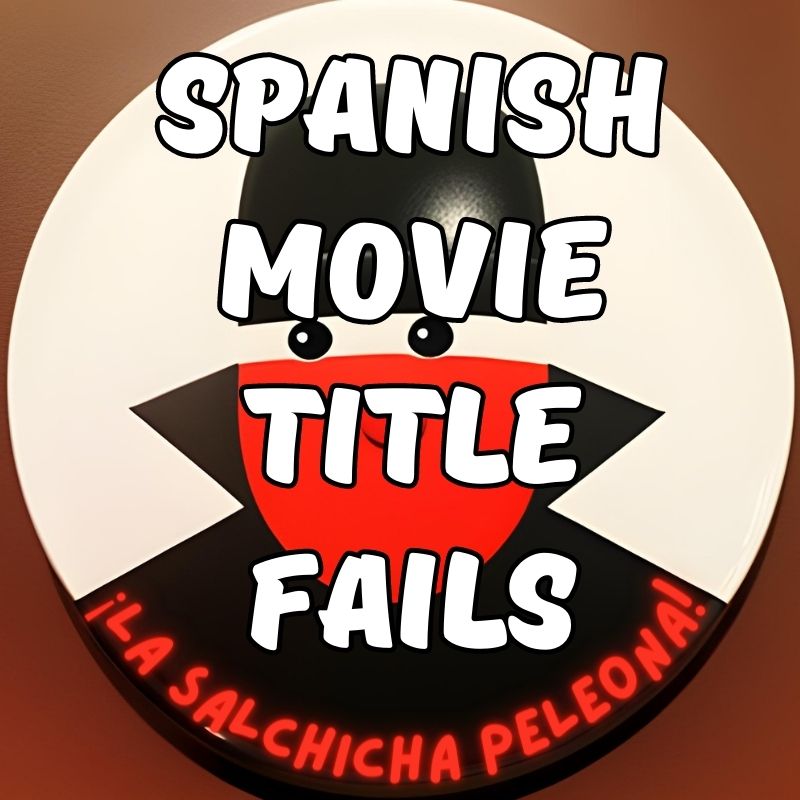Movie Titles in Spanish: 10 Funny Translations of Famous Movies

Get our free email course, Shortcut to Conversational.
Have conversations faster, understand people when they speak fast, and other tested tips to learn faster.
More infoMovies are a form of art that transcends borders and cultures, but sometimes, the magic gets lost in translation. In the world of cinema, we have witnessed numerous occasions where movie titles have been translated strangely, comedically, or simply incorrectly.
As a light-hearted complement to our post on Disney Movies in Spanish, in this post we’ll explore some of the funniest and most-misguided translations of movie titles into Spanish. Get ready to laugh and be surprised by these curious movie titles in Spanish!
Die Hard – La Jungla de Cristal (Spain)
In this successful action franchise starring Bruce Willis, the first film was titled “Die Hard” in English, which has the connotations of “to die with difficulty” or “to never give up.”
However, in Spain, the Spanish translation became “La Jungla de Cristal.” This phrase describes an iconic scene from the movie, but does not convey the same sense of tenacity and resilience as the original title. In addition, it doesn’t work as well for the sequels.
In Latin America, “Die Hard” was translated as “Duro de Matar” (Hard to Kill) which works better with the main plot.
Home Alone – Mi Pobre Angelito (Latin America)
One of the most beloved holiday movies, “Home Alone” tells the story of a young boy accidentally left behind when his family goes on vacation. The English title, “Home Alone,” captures the essence of the film perfectly.
However, in the Latin American translation it became “Mi Pobre Angelito.” Meaning “My Poor Little Angel,” this title doesn’t actually convey the point of the movie.
The translation in Spain was “Solo en Casa” which is a direct translation of the original title.
The Sound of Music – La Novicia Rebelde (Latin America) – Sonrisas y Lágrimas (Spain)
This timeless musical classic set in Austria during the second world war became “La Novicia Rebelde” (The Rebellious Novice) in Latin America and “Sonrisas y Lágrimas” (Smiles and Tears) in Spain. Though the translations aren’t that bad, both feel kind of off and drift from the musical element of the film.
Beverly Hills Ninja – La Salchicha Peleona (Spain)
This comedy about a ninja with poor skills sent to Beverly Hills on a mission took on a weird twist in its Spanish translation. It became “La Salchicha Peleona,” which literally means “The Belligerent Sausage.” We wish we could tell you why!
Although the absurdity of the title is really funny, it was definitely a translation fail.
Ice Princess – Soñando, soñando… triunfé patinando (Spain)
“Ice Princess” is a movie about a young girl who discovered that her true passion was ice skating, and not going to Harvard. The English title was short and precise, but it seems somebody wanted to go big and it ended up being translated as “Dreaming, dreaming… I succeeded at skating” in Spain. This sure seems like a bit too much.
The translation for Latin America was “Sueños Sobre Hielo,” meaning “Dreams on Ice,” which was a lot more catchy.
Eternal Sunshine of the Spotless Mind – ¡Olvídate de mí! (Spain)
This mind-bending romantic drama starring Jim Carrey and Kate Winslet was titled “Eternal Sunshine of the Spotless Mind” in English, reflecting a quote from Alexander Pope’s poem “Eloisa to Abelard.” The phrase implies the eternal happiness found in ignorance or forgetfulness of painful memories.
In Spain, this beautifully poetic title was simply translated as “¡Olvídate de mí!”, meaning “Forget about me!” which is a bit too blunt and doesn’t really convey the poetic nature of the original title.
Thelma and Louise – Un Final Inesperado (Latin America)
This iconic road film starring Geena Davis and Susan Sarandon was titled “Thelma and Louise” in English. In Latin America, the Spanish translation became “Un Final Inesperado” which means “An Unexpected Ending.” While the translated title accurately describes the unexpected turn of events in the movie, it is also a huge spoiler!
Fist of Legend – Jet Li es el Mejor Luchador (Spain and Latin America)
Talking about spoilers, “Fist of Legend” was translated as “Jet Li is the Best Fighter,” which just sounds like a lazy review. Closer translations like “Puño de Leyenda” or “Puño Legendario” would have been much catchier, without giving away the whole plot.
Superbad – Supercool (Latin America)
Was there a reason to take the English title and replace it with another English title that means the opposite? We might never know. While the reasoning behind this choice remains a mystery, it certainly leaves us scratching our heads and pondering the intricacies of language and cultural adaptations in the realm of cinema.
The Cell – La Célula (Latin America)
This one is just wrong. “Cell” in Spanish can be translated as “celda,” referring to a small room in which a prisoner is locked up, or “célula,” which is the basic unit of living beings.
If you don’t know much about this movie, one of the most remarkable things about the plot is that there is a serial killer that locks his victims in a cell, so you get what went wrong here. In Spain, the movie was accurately translated as “La Celda.”
Conclusion
Movie title translations can be tricky, as they need to capture the essence and appeal of the original while catering to cultural nuances and language differences. In the Spanish translations of these movies, we’ve encountered instances of direct translations, colloquial adaptations, and the loss of subtle wordplay.
While some translations successfully convey the essence of the film, others may leave us scratching our heads or laughing at the unexpected choices.
Nevertheless, these funny and sometimes awkward translations add a touch of humor and curiosity to the world of cinema, making them a fascinating aspect of cross-cultural entertainment!



